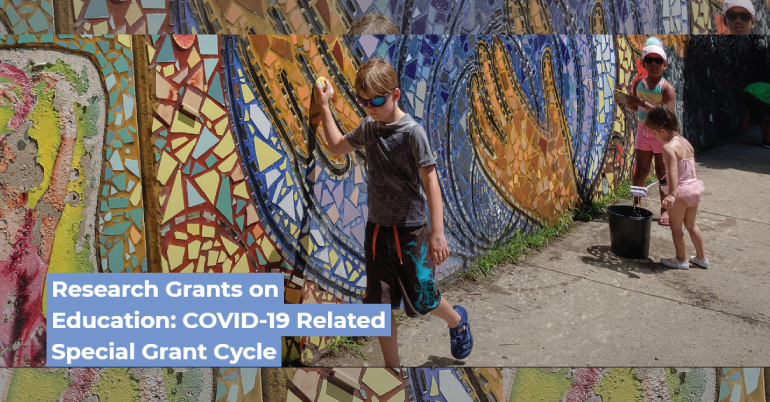The COVID-19 Related Research Grants support education research projects that will contribute to understanding the rapid shifts in education in this time of crisis and change. Spencer Foundation is especially interested in supporting two primary categories of projects. First, they are interested in supporting studies that aim to understand and disrupt the reproduction and deepening of educational inequality caused by the COVID-19 crisis. Second, they also recognize that in times of great disruption and change, there may be opportunities to remake and imagine a new form of equitable education. Thus, they are also interested in research projects that are working to reimagine educational opportunities in these times.
As with other Spencer grant programs, this program is “field-initiated” in that proposal submissions are not for a particular research topic, discipline, design, method, or location. They will be accepting applications on a rolling basis with budgets up to $50,000 for projects ranging from one to three years. They will review applications received by May 4th, again on May 18th, and again on June 8th. Their goal for this program is to support rigorous, intellectually ambitious, and technically sound research that is relevant to the most pressing questions and compelling opportunities in education in these times.
Looking for fully-funded opportunities, install the Youth Opportunities Android or iOS App here.
To this end, this program supports proposals from multiple disciplinary and methodological perspectives, both domestically and internationally, from scholars at various stages in their careers. They anticipate that proposals will span a wide range of topics and disciplines that innovatively investigate questions central to education in times of crisis. Moreover, we expect and welcome methodological diversity in answering pressing questions; thus, they are open to projects that utilize a wide array of research methods including quantitative, qualitative, mixed-methods, ethnographies, design-based research, participatory methods, and historical research, to name a few. They are open to projects that might incorporate data from multiple and varied sources or work closely with practitioners or community members over the life of the project. Further, they recognize that social distancing policies may pose challenges to some modes of inquiry. They encourage creative new approaches to the collection and analysis of data.
Benefits
The COVID-19 Related Research Grants supports education research projects that will understand the rapid shifts and contribute to the improvement of education during this time of crisis with budgets up to $50,000 for projects ranging from one to three years.
Eligibilities
- Proposals to this program must be for academic research projects that aim to study education. Proposals for activities other than research are not eligible (e.g., program evaluations, professional development, curriculum development, scholarships, capital projects). Additionally, proposals for research studies focused on areas other than education are not eligible.
- Principal Investigators (PIs) and Co-PIs applying for a COVID-19 Related Research Grant on Education must have an earned doctorate in an academic discipline or professional field or appropriate experience in an education research-related profession. While graduate students may be part of the research team, they may not be named the PI or Co-PI on the proposal.
- The PI must be affiliated with a non-profit organization that is willing to serve as the administering organization if the grant is awarded. The Spencer Foundation does not award grants directly to individuals. Examples include non-profit colleges, universities, school districts, and research facilities, as well as other non-profit organizations with a 501(c)(3) determination from the IRS.
- Proposals are accepted from the U.S. and internationally, however, all proposals must be submitted in English and budgets must be proposed in U.S. Dollars.
Application Process
Step 1 – Registration
- Note: This application is configured for the Principal Investigator (PI) on the project to register and submit the form. If someone other than the PI will be completing the online application (e.g., an administrative assistant), the PI should register as described in Step 1 below, then provide their username and password to the person assisting them with the application.
- If you (the PI) have never accessed the Spencer Foundation online portal, you must register and create a profile by going to the Apply Now link.
- Follow the guidelines on the registration page to create your profile.
- If you already have an account, log on to update your profile and access the application.
Step 2 – My Profile
- After logging in, follow the directions to complete the information requested on the My Profile page and upload your current CV (10-page limit). The My Profile page is your online account with the Spencer Foundation whether you are applying for a grant, reviewing a proposal, or submitting a grantee report.
- Note: If you will have Co-PIs on your project, they must also register and complete their profile information if they wish to be included on the application.
Step 3 – Start a Proposal
- To fill out the application, go to your Workbench and click the Apply button for the Special COVID-19 Related Research Grant program. Your draft application can be saved and returned to so that you may continue work on it at a later time and can be found on your Draft Proposals list on your Workbench.
Looking for fully-funded opportunities, install the Youth Opportunities Android or iOS App here.
Application Deadline: June 8, 2020
Application ClosedOfficial link









